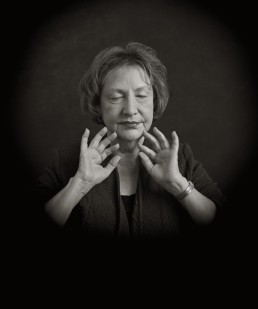S1: Episode 2 - Wanda Austin

Episode Information
[Intro Music]
Narrator: Welcome to My Heart is Not Blind. Narrative histories about blindness and perception. A traveling exhibition and book published by Trinity University Press, supported by Gronkowski Charitable Foundation, edited and hosted by Michael Nye. Every person. Every place is a map to somewhere else. Episode two Wanda Austin.
Wanda: I remember looking up into the night sky at one point and realizing that I no longer could see the stars. It was gradual. You become more aware when you start walking into things and it’s a puzzle in your mind. How long do I have to see? And I knew I was in big, big trouble when I walked into my kitchen one day and I couldn’t tell that I had turned the light on. And that was the change point of my life. I remember thinking to myself, Girl, you are in trouble. Frankly, I felt like 20 tons of bricks were sitting on my shoulder just weighed down deep.
I really didn’t think about being a counselor until after I lost my sight. I acquired my bachelor’s degree first. I was totally blind at that time. And then I went on to acquire my master’s degree in mental health counseling. And I, I got through the process because I work very hard. I am a forever learner. I just couldn’t get enough <laugh>. It was like I couldn’t wait to read the next book. And my books were on audio. I just delved into it like I was dying into a wonderful swimming pool and just swam in the learning process. <laugh>, I believe I am good at what I do. I’ve seen people come in so lethargic and wanting to die and planning to die, and finding a way out of that abyss. I see a lot of depression and anxiety. I talked to someone yesterday who was consumed with anger.
It’s like a life lost. Often it’s hurt, deep hurt. They might be heard about relationships. People that pull away from them, heard about the loss of their livelihood or, you know, being shot in the face with a gun. And they not only have the, the sight loss to deal with, they have the trauma of the memories of what happened. Although it’s very abstract, people need hope. I view hope as the fuel of life. If you run out of gas in your car, you don’t go anywhere. It’s the energy of life. It’s the fuel of life.
To move forward. One must accept. I don’t like to use words like must and should, but it’s pretty imperative. You can’t just say to someone, Well, you’ll feel better when you accept this <laugh> I wish it were that easy. But it, it comes day by day. You can fight, you can kick and you can scream, but you’re fighting reality. So acceptance is crucial with acceptance. It gives them the empowerment, the energy. They become open to ideas. Well, what else can I do? Or how can I do this differently? The first thing you need to do is listen. You know, when you start to really pay attention to what you hear as opposed to what you see, you hear more than others do. I look for leverage. Every single word can mean something. I reach into my imaginary tool chest <laugh> of techniques that can give that person the leverage that they need in their life.
Sometimes it’s just a tool to help them understand themselves a little better or change their mood. There’s this perception that blind people or people who cannot see well are helpless. And I’ve had that experience many times. You know, talk to you like you’re second grader. And sometimes I say, You don’t have to yell. I can hear you very clearly when you’re talking in normal tone of voice, <laugh>. And they’ll say, Oh, okay. And then pretty soon they’re talking loud again. <laugh>, I think blindness was a good thing that happened to me. <laugh>, I know that sounds really strange. Would I like to see again? Absolutely. But blindness gave me the impetus to re reinvent myself. Blindness added depth to my life, and skills and ability to listen and understand ability to help good can come out of difficulty.
I, I don’t think anybody can imagine who sees well how much energy it takes to live life without sight because it requires continual focus, continual awareness of every step you take. And life is different having accidents. It’s not terrible to be blind, but it is challenging. Oh, when you have an avalanche and dishes break all over the place in the kitchen at 1130 at night, and you’re the only one that can clean ’em up. At least I can feel for the pieces of glass. Some people don’t have use of their arms. So I think it’s just perspective. It’s our perspective that’s so important about how we view the situation and live that life.
[Outro Music]
Host: This is Michael Nye, and you have been listening to a podcast of narrative histories. Wanda Austin is from Tarpon Springs, Florida. She’s a licensed mental health counselor. She said, “I see myself as a helper. I look for leverage as I listen. Every single word can mean something. My primary goal is to give people hope, empowerment and tools to help them heal whatever needs to be healed.
Join me next week. Two new episodes will be released. Please subscribe, rate, and review this podcast. You can also go to my website, michaelnye.org/podcast for transcripts and other information. There are so many ways. Different ways to experience moments to their fullest. Thank you for listening.
